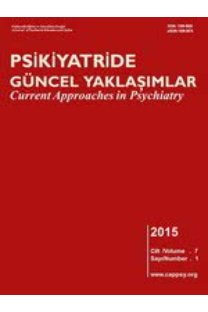Psikolojik Sağlık Açısından Yetişkin Olma
Yetişkin, evlilik, sağlığın sosyal belirleyicileri, ruh sağlığı
Becoming Adult from the Perspective of Psychological Health
Adult, marriage, social determinants of health, mental health,
___
- Aasheim V, Waldenström U, Hjelmstedt A, Rasmussen S, Pettersson H, Schytt E (2012) Associations between advanced maternal age and psychological distress in primiparous women, from early pregnancy to 18 months postpartum. Br J Obstet Gynaecol, 119: 1108–1116.
- Akça H, Ela M (2012) Türkiye’de eğitim, doğurganlık ve işsizlik ilişkisinin analizi. Maliye Dergisi, 163:223-242.
- Amin S, Al-Bassusi NH (2004) Education, wage work, and marriage: perspectives of Egyptian working women. J Marriage Fam, 66:1287-1299.
- Amuedo-Dorantes C, Kimmel J (2005) The motherhood wage gap for women in the United States: the importance of college and fertility delay. Rev Econ Househ, 3:17-48.
- Andersen AN, Hansen KD, Andersen PK, Smith GD (2004) Advanced paternal age and risk of fetal death: a cohort study. Am J Epidemiol, 160:1214–1222.
- Arı S (2012) Anne bebek bağlanması ile doğum sonu depresyon arasındaki ilişki (Yüksek lisans tezi). İstanbul, İstanbul Üniversitesi.
- Arnett JJ (2000) Emerging adulthood: a theory of development from the late teens through the twenties. Am Psychol, 55:469-480.
- Arnett JJ (2001) Conceptions of the transition to adulthood: Perspectives from adolescence through midlife. J Adult Dev, 8:133-143.
- Astolfi P, De Pasquale A, Zonta LA (2004) Late paternity and stillbirth risk. Hum Reprod, 19:2497–2501.
- Astolfi P, De Pasquale A, Zonta LA (2005) Late childbearing and its impact on adverse pregnancy outcome:stillbirth, preterm delivery and low birth weight. Rev Epidemiol Sante Publique, 53:97-105.
- Atak H, Tatlı CE, Çokamay G, Büyükpabuşcu H, Çok F (2016) Yetişkinliğe geçiş: Türkiye’de demografik ölçütler bağlamında kuramsal bir gözden geçirme. Psikiyatride Güncel Yaklaşımlar, 8:204-227.
- Aycan Z, Eskin M (2005) Relative contributions of childcare, spousal support, and organizational support in reducing work–family conflict for men and women: the case of Turkey. Sex Roles, 53:453-471.
- Aydemir E (2011) Evlilik mi Evcilik mi? Erken ve Zorla Evlilikler Çocuk Gelinler. Ankara, Uluslararası Stratejik Araştırmalar Kurumu.
- Bagner DM, Pettit JW, Lewinsohn PM, Seeley JR, Jaccard J (2013) Disentangling the temporal relationship between parental depressive symptoms and early child behavior problems: a transactional framework, J Clin Child Adolesc, 42:78-90.
- Balasch J, Gratacos E (2012) Delayed childbearing: effects on fertility and the outcome of pregnancy. Curr Opin Obstet Gynecol, 24:187–193.
- Beck CT (2001) Predictors of postpartum depression an update. Nurs Res, 50:275-285.
- Beckman LJ, Houser BB (1982) The consequences of childlessness on the social-psychological well-being of older women. J Gerontol, 37:243-250.
- Beets MW, Foley JT (2008) Association of father involvement and neighborhood quality with kindergartners' physical activity: a multilevel structural equation model. Am J Health Promot, 22:195-203.
- Bell S, Lee C (2006) Does timing and sequencing of transitions to adulthood make a difference? stress, smoking, and physical activity among young Australian women, Int J Behav Med, 13:265-274.
- Belsky J (1993) Etiology of child maltreatment: a developmental-ecological analysis. Psychol Bull, 114:413-434.
- Benzies K, Tough S, Tofflemire K, Frick C, Faber A, Newburn-Cook C (2006) Factors influencing women’s decisions about timing of motherhood. J Obstet Gynecol Neonatal Nurs, 35:625–633.
- Berlin LJ, Brady-Smith C, Brooks-Gunn J (2002) Links between childbearing age and observed maternal behaviors with 14-month-olds in the Early Head Start Research and Evaluation Project. Infant Ment Health J, 23:104-129.
- Beutel M, Kupfer J, Kirchmeyer P, Kehde S, Kohn M, Schroeder-Printzen I et al (1999) Treatment-related stresses and depression in couples undergoing assisted reproductive treatment by IVF or ICSI. Andrologia, 31:27-35.
- Bianchi SM, Milkie MA (2010) Work and family research in the first decade of the 21st century. J Marriage Fam, 72:705-725.
- Billari FC, Goisis A, Liefbroer AC, Settersten RA, Aassve A, Hagestad G et al (2011) Social age deadlines for the childbearing of women and men. Hum Reprod, 26:616–622.
- Bishop AJ, Martin P (2007) The indirect influence of educational attainment on loneliness among unmarried older adults. Educ Gerontol, 33:897–917.
- Bisschop MI, Kriegsman DM, Beekman AT, Deeg DJ (2004) Chronic diseases and depression:the modifying role of psychosocial resources. Soc Sci Med, 59:721–733.
- Blackburn ML, Bloom DE, Neumark D (1993) Fertility timing, wages, and human capital. J Popul Econ, 6:1-30.
- Bornstein MH, Putnick DL (2007) Chronological age, cognitions, and practices in European American mothers: a multivariate study of parenting. Dev Psychol, 43:850-864.
- Bouchard G, Lachance-Grzela M, Goguen A (2008) Timing of the transition to motherhood and union quality: the moderator role of union length. Pers Relationsh, 15:71-80.
- Boyd D, Bee H (2015) Lifespan Development, 7th edition. UK, Pearson.
- Bram S (1984) Voluntarily childless women: traditional or nontraditional? Sex Roles, 10:195-206.
- Brand JE, Davis D (2011) The impact of college education on fertility: evidence for heterogeneous effects. Demography, 48:863-887.
- Bulanda RE, Lippmann S (2012) The timing of childbirth and family-to-work conflict. Sociol Focus, 45:185-202.
- Bumpass LL, Martin TC, Sweet JA (1991) The impact of family background and early marital factors on marital disruption. J Fam Issues, 12:22-42.
- Cairney J, Boyle M, Offord DR, Racine Y (2003) Stress, social support and depression in single and married mothers. Soc Psychiatry Psychiatr Epidemiol, 38 :442–449.
- Carlson D (2011) Explaining the curvilinear relationship between age at first birth and depression among women. Soc Sci Med, 72:494-503.
- Casad BJ, Marcus-Newhall A, Nakawaki B, Kasabian AS, LeMaster J (2012) Younger age at first childbirth predicts mothers’ lower economic and psychological well-being later in life. J Fam Econ Issues, 33:421-435.
- ISSN: 1309-0658
- Yayın Aralığı: 4
- Başlangıç: 2009
- Yayıncı: Psikiyatride Güncel Yaklaşımlar
Şizofrenide Görülen Tıbbi Durumlar
Betül DÖNGEL DEMİREL, Lut TAMAM, Gül KIR
Anoreksiya Nervoza’da Psikososyal Tedaviler
Necati Serkut BULUT, Neşe YORGUNER KÜPELİ, Gresa ÇARKAXHİU BULUT, Volkan TOPÇUOĞLU
Çocuk ve Ergenlerde Yeme Bozuklukları
Bir Göçmen Olarak Anneliğe Geçiş: Riskler ve Engeller
Rüveyde Aydın, Öznür Körükcü, Kamile KABUKCUOĞLU
Psikolojik Sağlık Açısından Yetişkin Olma
